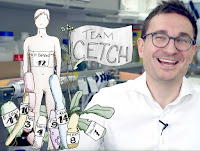Despite the vast diversity of organisms on the planet that express enzymes for the conversion of carbon dioxide into such organic compounds as sugars - as plants do through photosynthesis - the efforts to harness these capabilities to transform CO2 into high-value products such as biofuel and renewable chemicals have met with limited success. While increasing concentration of CO2 in the atmosphere poses a challenge, researchers also see it as an opportunity.
Now a team from the Max-Planck-Institute (MPI) for Terrestrial Microbiology in Marburg, Germany, by tapping the DNA synthesis expertise of the U.S. Department of Energy Joint Genome Institute (DOE JGI) has reverse engineered a biosynthetic pathway for more effective carbon fixation. This novel pathway is based on a new CO2-fixing enzyme that is nearly 20 times faster than the most prevalent enzyme in nature responsible for capturing CO2 in plants by using sunlight as energy.
...
This generation of researchers are concerned about how to capture excess carbon dioxide, remove it from the atmosphere and render it into energy and natural products for the economy.
"Now Berkeley Lab through the DOE Joint Genome Institute, has been a major contributor to our understanding of the vast genetic diversity of microorganisms and their roles in the environment, particularly in carbon cycling," said Yasuo Yoshikuni, the head of the DNA Synthesis Science group at the DOE JGI. "By sequencing underexplored phyla from ecologically important niches, we have homed in on the genes and pathways that we now are able to synthesize in the lab to unravel novel strategies that nature uses for carbon metabolism. Identifying these genes encoding CO2 -fixing enzymes and their biological function, is one of the important missing pieces in the climate puzzle."
Emboldened by the successful reconstitution of a synthetic enzymatic network in a test tube for the conversion of CO2 into organic products that is superior to chemical processes and competes with favorably with those in nature, Erb said this opens the door for other future applications.
Read more at Engineering a More Efficient System for Harnessing Carbon Dioxide

No comments:
Post a Comment